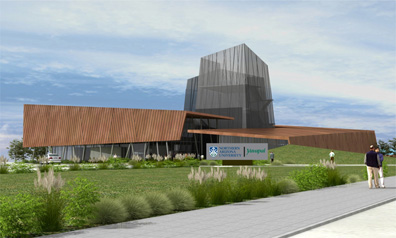
NAU-Yavapai in Prescott Valley will open in the fall with a few continuing students from Yavapai, adding more students and courses beginning in January.
The venture is consistent with Arizona Gov. Jan Brewer’s charge to the Arizona Board of Regents to create a new business model focused on affordability, accessibility and predictability in the Arizona University System. The goal is to increase the number baccalaureate degrees by at least 50 percent by 2020, which is part of the universities’ strategic plan.
The increased number of baccalaureates is believed necessary for Arizona’s economy to remain competitive.
At the new NAU-Yavapai, tuition would be considerably lower than the cost of a residential education at one of Arizona’s three research universities. “We have the opportunity to truly offer a different option,” said NAU President John Haeger. “We don’t want to re-create the current system.”
NAU has been charged with developing at least two regional universities by working in tandem with community college partners. Yavapai College and Coconino Community College are among the first partners in this undertaking with Arizona Western College in Yuma also being considered.
NAU currently has a strong presence at the three community colleges, and NAU-Yuma already is a branch campus.
“We will offer very structured programs with limited choice, but all your courses will count toward your degree,” Haeger said. “We will have classes running 12 months a year instead of a semester system. Students can go as fast as they want.”
James F. Horton, president of Yavapai College, said the new plans will build on an already great partnership and move both institutions into a new and exciting direction. “We’re looking to give students the best value in higher education,” Horton said. “We are creating an affordable and accessible combination of in-person and online delivery that meets the needs of today’s students.”
Horton described finding the new location for NAU-Yavapai as “serendipitous—the stars are aligning.” A 10,000-square-foot add-on to the new city library building will be used for classes and other academic business. Students also will have access to all the library amenities, he said.
As part of the overall system revision, the University of Arizona will extend its partnerships with community colleges in Pima, Santa Cruz, Cochise and Pinal counties, and possibly some Maricopa County locations. Arizona State University will be developing campuses for high-demand degree programs—called the Colleges @ ASU—in Maricopa County.
All three universities are exploring the feasibility of establishing Arizona Public University Centers offering courses from all three institutions on a limited basis in certain counties.
Ernest Calderón, incoming president of Arizona Board of Regents, added another element to the system architecture discussion on Friday during the ABOR meeting in Flagstaff.
He asked the three university presidents to “research and refine” his proposal for partnerships between the universities and the state’s community colleges where students would take three years at a community college and one year at a university.
Calderón’s proposal calls for a select few university majors to be offered through a regimented program in which curriculum is determined by the universities but delivered through the community colleges—at community college tuition—for the first three years. In the fourth year, students would attend a university—at university cost—and graduate with a baccalaureate.
“This is a very rigid, fast-track model that would provide a quick route to a baccalaureate degree,” Calderón said. He added that this proposal could cut the cost of a baccalaureate by 60 percent.
The NAU-Yavapai undertaking is the first step toward creating regional universities—institutions of higher learning that focus on students earning baccalaureate degrees. The regional universities would have no research component and offer structured programs, fewer majors and a delivery system blending in-person and web.
“This partnership will have much more depth than we’ve previously done with Yavapai College,” Haeger explained. “The community college will be very much involved in the first two years of study, but when students first walk in the door, they would know that it’s an NAU-Yavapai partnership and they’re on the path to a four-year baccalaureate. “
The program creates a seamless path toward an NAU baccalaureate through joint admissions and advising. “It eliminates the issue of course transfer,” Haeger said.
The new venture takes the additional step of adding NAU professors, advisers and administrators on-site and offering three to four bachelor’s degrees, though degree programs have not been decided.
“This offers a choice for students,” Haeger said. “Northern Arizona University would still operate its research institution in Flagstaff, but the Yavapai venture is very teaching focused.”
Some operational and governance issues still must be resolved, but the joint venture will be overseen by both NAU and Yavapai College. Yavapai College serves about 300 students, and the new NAU-Yavapai will have capacity for at least 600.
Haeger assured students that the baccalaureate degrees from NAU-Yavapai will have the same requirements and the same quality as other NAU degrees.
The NAU president also is confident the state will find a way to fund research institutions and regional universities. “Ultimately, the state will figure out how to get more funding if they truly want more baccalaureate degrees.”



